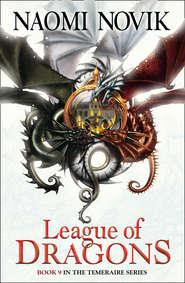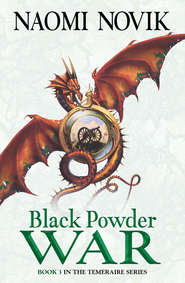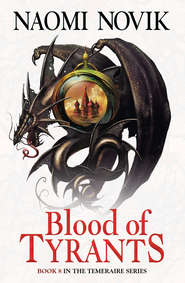По всем вопросам обращайтесь на: info@litportal.ru
(©) 2003-2024.
✖
Empire of Ivory
Автор
Год написания книги
2019
Настройки чтения
Размер шрифта
Высота строк
Поля
‘You cannot often have been in Dorset, I suppose, Captain.’
‘No, I have not had the pleasure before, ma’am,’ Laurence said. ‘My uncle lives near Wimbourne, but I have not visited him in many years.’
‘Oh! The perhaps you are acquainted with Mrs. Brantham’s family?’
One of the ladies, who had been nodding off, roused long enough to say, with sleepy tactlessness, ‘I am sure he is not.’
‘It is not likely that I been introduced, ma’am; my uncle moves very rarely outside his political circles,’ Laurence said, after a pause. ‘Also, my service has kept me from enjoying wider society, particularly these last few years.’
‘But what compensations you must have had!’ Lady Catherine said. ‘I am sure it must be glorious to travel by dragon, without any worry that you could be sunk in a gale, and to arrive so much more quickly.’
‘Ha ha, unless your ship grows tired of the journey and eats you,’ Captain Ferris said, nudging his younger brother with his elbow.
‘Richard, what nonsense, as if there were any danger of such a thing! I must insist that you withdraw the remark,’ Lady Catherine said. ‘You offend our guest.’
‘Not at all, ma’am,’ Laurence said, discomfited; the vigour of her objection gave an undeserved weight to the joke. He could more easily have borne the jest than her compliments, which he could not help but feel were excessive and insincere.
‘You are kind to be so tolerant,’ she said. ‘Of course, Richard was only joking, but you would be simply appalled to know how many people in society say such things and believe them. I am sure it is very poor-spirited to be afraid of dragons.’
’ ‘I am afraid it is only the natural consequence,’ Laurence said, ‘of the unfortunate state of affairs that prevails in our country, which keeps dragons isolated in distant coverts and encourages horrific conjecture.’
‘But, what else is to be done with them?’ Lord Seymour said. ‘Are we to put them in the village square?’ He amused himself greatly with this suggestion; he was by now uncomfortably florid of face, having heroically performed his duty as host over a second dinner. Even now he did justice to another glass of port, over which he coughed as he laughed.
‘In China, they can be seen in the streets of every town and city,’ Laurence said. ‘They sleep in pavilions no more separated from residences than town-houses in London.’
‘Heavens;’ I would not sleep a wink,’ Mrs. Brantham said, with a shudder. ‘How dreadful these foreign customs are.’
‘It seems to me a most peculiar arrangement,’ Seymour said, his brows drawing together. ‘How do the horses stand it? My driver in town must go a mile out of his way when the wind is in the wrong quarter and blowing over the covert, because the beasts get so skittish.’
Laurence had to concede that even in China they did not cope well; horses were not often evident in the cities, except for trained cavalry beasts. ‘But I assure you their lack is not felt; they employ dragons as living carriages, and citizens of higher estate are conveyed individually by courier, at as you can imagine a much higher rate of speed. Indeed, Bonaparte himself has adopted the system, at least within his encampments.’
‘Oh, Bonaparte,’ Seymour said. ‘No; thank goodness we organize things more sensibly here. I have been meaning to congratulate you. Ordinarily, not a month goes by when my tenants do not complain about the patrols passing overhead, frightening their cattle to pieces and leaving their—’ he waved his hand expressively as a concession to the ladies ‘—everywhere, but this six-month there has been not a peep from them. I suppose you have implemented new routes, and none too soon. I had nearly made up my mind to raise the matter in Parliament.’
Though aware of the circumstance reducing the frequency of the patrols, Laurence could not answer this remark in a civil fashion; so he did not answer at all, and instead went to fill his glass again.
He took it away and went to stand by the window furthest from the fire, to keep his senses refreshed by the cool draught. Lady Seymour had taken a seat beside it for the same reason. She had put aside her wineglass and was slowly fanning herself. When he had stood there for a moment she made a visible effort to engage him. ‘So Captain, you were forced to shift from the Navy to the Aerial Corps? It must have been very hard. I suppose you must have gone to sea when you were fully mature?’
‘I first took ship at the age of twelve, ma’am,’ Laurence said.
‘Oh! But you must have come home, from time to time, surely? And twelve years is not as young as the schooling age of seven; no one can say there is no difference. Even so, I am sure your mother must never have thought of sending you from home at such an age.’
Laurence hesitated, conscious that Lady Catherine and indeed most of the other company, who had not dozed off, were now listening to their conversation. ‘I was fortunate to secure a berth more often than not, so I was not much at home.’ he said, as neutrally as he could. ‘I am sure it must be hard, for a mother, in either case.’
‘Hard! Of course it is hard,’ Lady Catherine said, interjecting. ‘What of it? We mothers ought to have the courage to send our sons, if we expect them to have the courage to go, and we should not view it as some sort of grudging sacrifice and send them off so late that they are too old to properly take to the life.’
‘I suppose,’ Lady Seymour said, with a tight, angry smile, ‘that we might also starve our children, to accustom them to privation, and force them to sleep in a pigsty, so they might learn to endure filth and cold.’
What little other conversation had gone forward, now was completely extinguished. Spots of colour stood high on Lady Catherine’s cheeks. Lord Seymour snored prudently by the fire, his eyes shut, and poor Lieutenant Ferris had retreated into the opposite corner of the room and was staring fixedly out the window into the pitch-dark grounds, where nothing was to be seen.
Laurence, sorry to have blundered into an long-standing quarrel, attempted to make peace, and said, ‘I hope you will permit me to say that I have found the Corps to be undeserving of the character it has been given. I believe it to be no more dangerous or distasteful day to day, than any other branch of the military; I can, from my own experience, say that our sailors face as much hard duty as the aviators, and I am sure that Captain Ferris and Colonel Prayle will attest to the privations of their respective services,’ he raised his glass to those gentlemen.
‘Hear, hear,’ Prayle said, coming to his aid, jovially, ‘aviators cannot claim all the hard luck. We fellows also deserve our fair share of your sympathy. But you may be sure that they will always possess the latest news of the war; Captain Laurence, you must know better than any of us, what is occurring on the Continent. Tell us, is Bonaparte preparing for invasion again, now that he has packed the Russians off home?’
‘Pray do not speak of that monster,’ Mrs. Brantham spoke up. ‘I am sure I have never heard anything half so dreadful as what he has done to the Queen of Prussia by taking both her sons away to Paris!’
At this, Lady Seymour, still flushed, spoke out, ‘Poor woman, she must be in agony. What mother’s heart could bear it! Mine would break to pieces, I know.’
‘I am sorry to hear that,’ Laurence said, to Mrs. Brantham, breaking the awkward silence that followed. ‘They are very brave children.’
‘Henry tells me you have had the honour of meeting them, during your service, Captain Laurence, and the Queen too,’ Lady Catherine said. ‘I am sure you must agree, that however much her heart should break, she would never encourage her sons to be cowards, and hide behind her skirts.’
He could say nothing to this without prolonging the squabble, so simply gave her a bow. Lady Seymour was looking out the window, fanning herself with short jerky strokes. The conversation limped on a little longer, and as soon as he felt he could politely excuse himself, he did, on the grounds of their early departure.
He was shown to a very handsome room, which held signs of a hasty rearrangement; a comb by the washbasin suggested that it had been otherwise occupied until perhaps that very evening. Laurence shook his head at this fresh sign of over-solicitousness, and was sorry for the guest who had been inconvenienced on his account.
Before a full quarter of an hour had passed, Lieutenant Ferris knocked timidly on his door, and when admitted tried to express his regrets without precisely apologizing, as he could scarcely do. ‘I only wish she would not feel it so. I suppose it is because I did not want to go at the time, and she cannot forget that I wept,’ he said, fidgeting with the curtain uneasily. He was looking out the window to avoid meeting Laurence’s eyes. ‘But that was only fear of leaving home, as any child would experience; I am not sorry for it now, at all, and I would not give up the Corps for anything.’
He soon made his goodnights and escaped again, leaving Laurence to ruefully consider that the cold, open hostility of his father might yet be preferable to a welcome so anxious and smothering.
One of the footmen tapped at the door to offer valet services to Laurence, directly after Ferris had gone; but he had nothing to do. Laurence had grown so used to doing everything for himself, that his coat was already off, and his boots in the corner, although he was glad enough to send them away for blacking.
He had not long been abed before he was disturbed again, by a great barking clamour from the kennels and the mad shrilling of horses. He went to the window and saw lights coming on in the distant stables, and heard a thin faint whistling somewhere aloft, carrying clearly from a distance. ‘Bring my boots at once, if you please; and instruct the household to remain within,’ Laurence told the footman, who had responded hurriedly to his ring.
He went down in some disarray, tying his neck cloth with a flare in his hand. ‘Clear away, there,’ he called loudly to the servants who had gathered in the open court before the house. ‘Clear away: the dragons will need room to land.’
This intelligence emptied the courtyard. Ferris was already hurrying out, carrying his own signal-flare and a candle. He knelt down to ignite the blue light, which hissed into the air and burst high above them. The night was clear, and the moon only a thin slice; at once the whistling came again, louder: it was Gherni’s high ringing voice. She descended in a rustle of wings.
‘Henry, is that your dragon? Where do you all sit?’ asked Captain Ferris, coming down the stairs cautiously. Gherni, whose head did not reach the second storey windows, would have indeed been hard-pressed to carry more than four or five men. While no dragon could be described as charming, her blue-and-white china complexion was rather elegant, and the darkness softened the edges of her claws and teeth into a less threatening shape. Laurence was heartened to see that a few of the party, still more or less dressed, had gathered on the stoop to see her.
She cocked her head at Captain Ferris’ questions and said something in the dragon tongue that was quite incomprehensible, then sat up on her hind legs and called out a piercing answer to a cry that only she had heard.
Temeraire’s more resonant voice soon became audible, and he landed on the wide lawn behind Gherni. The lamps gleamed on his thousands of glossy obsidian scales, and his shivering wings kicked up a spray of dust and small pebbles that rattled against the walls like small-shot. He curved his great serpentine neck, so that his head was well clear of the roof. ‘Pray hurry, Laurence,’ he said. ‘A courier came to tell us that there is a Fleur-de-Nuit bothering the ships off Boulogne. I have sent Arkady and the others to chase him away, but I do not trust them to mind themselves without me there.’
‘No indeed,’ Laurence said, turning only to shake Captain Ferris’s hand; but there was no sign of him, or of any living souls but Ferris and Gherni. The doors had been shut tight, and the windows all were shuttered.
* * *
‘Well, we are in for it, make no mistake,’ Jane said, having received Laurence’s report in Temeraire’s clearing. They had fought the first skirmish off Weymouth, with the nuisance of chasing away the Fleur-de-Nuit, and then another alarm had roused them after just a few hours of snatched sleep; and quite unnecessarily so, for they arrived on the edge of dawn only to catch sight of a single French courier vanishing off over the horizon, chased by the orange gouts of cannon-fire from the fearsome shore battery, which had lately been established at Plymouth.
‘They were not real attacks,’ Laurence said. ‘Even that skirmish, though they provoked it. If they had bested us, they could not have stayed to take advantage of it; not upon such small dragons, and not if they wished to get themselves home before they collapsed.’
He had given his men leave to sleep a little on the way back, his own eyes closing once or twice during the flight, too; but that was nothing to seeing Temeraire almost grey with fatigue, and his wings tucked limply against his back.
‘No; they are probing our defences, more aggressively and sooner than I had expected,’ Jane said. ‘I am afraid they have grown suspicious. They chased you into Scotland with neither hide nor wing of another dragon to challenge them. The French are not fool enough to overlook the implications of that, however badly it ended for them. If one of their beasts reach the countryside and flies over the quarantine coverts, the game will be up: they will know they have license to invade.’
‘How have you kept them from growing suspicious this long?’ Laurence said. ‘Surely they must have noted the absence of patrols?’
‘We have managed to disguise the situation so far, by sending the sick on short rounds during clear days when they can be seen from a good distance,’ Jane said. ‘Many of them can still fly, and even fight for a little while, although none of them can stand a long journey. They tire too easily, and they feel the cold more than they should; they complain of aching bones, and the brisk winter has only made matters worse.’











